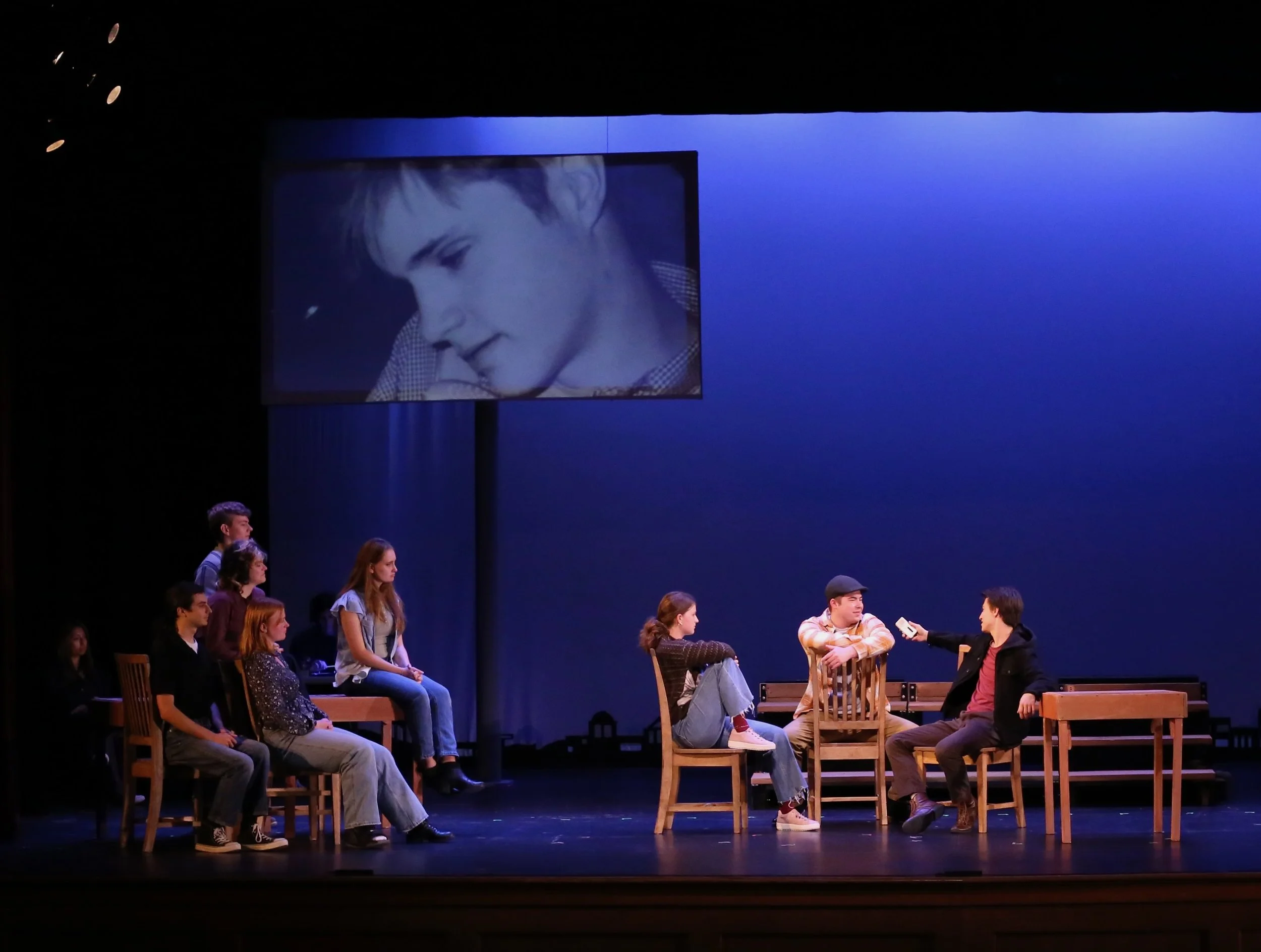Marist Theatre puts on “The Laramie Project”
"The Laramie Project" with a photo of Matthew Shepard in the background. Photo by Eileen Curley.
Marist Theatre tackled a sensitive topic this semester with “The Laramie Project,” a play exploring the aftermath of the 1988 hate crime murder of Matthew Shepard.
“The Laramie Project,” written by Moisés Kaufman and directed by Christine Crawfis, consists of the reactions from the citizens of Laramie, Wyoming, after the death of Matthew Shepard. The play is based on over 200 interviews conducted by the Tectonic Theater Project with people who lived in the community, with reactions ranging from tragic to prejudiced, and everything in between.
“This isn't a normal play. We aren't depicting characters, we're depicting people. These are real words that real people have spoken, and it is our job to redeliver those words to the audience to keep them alive, however the audience may interpret them,” said Nicholas Ferrari ‘27, a member of the acting ensemble.
Consequently, the play revolves around sensitive topics, such as brutality and anti-gay violence, that the actors are forced to not just navigate, but handle with care and respect. Although this presented as a challenge, with the proper research, the actors were able to execute the interviews effectively.
Member of the acting ensemble, Megan Metivier ‘28, said, “The entire company had many long discussions about how to handle certain topics. We talked a lot about how we, as actors, felt about the words of the play, how they impacted us as human beings, and then how we could incorporate that into our stories.”
Among casual clothing, only chairs as props and a projector to support the narrative, the actors delivered raw emotion with respect in the nearly three-hour-long production. Though the play was written between 1998 and 1999, one might argue that many themes remain relevant, or even indistinguishable, even over 25 years later.
“I'd go beyond saying that putting on plays that touch on these topics is important, it's necessary,” said Ferrari. “Sharing these stories and keeping them alive through literature is the stuff that inspires change and activism for our future.”
Marist Theatre collaborated with Marist Pride, Dutchess County Pride and the Matthew Shepard Foundation to put on this play and provide students with a resource after witnessing a powerful and emotionally triggering production.
“We collaborated with them because this play discusses topics that many people may have either experienced, witnessed or feel emotionally connected to. By uniting with [these resources], we’re bringing the Marist community together against hate, especially during a difficult time in society,” said Sophia Seriale ‘26, president of the Marist Theatre Guild.
Last year, the theatre department put on “Peter and the Starcatcher” as their fall mainstage production, a play that unravels the story of how Peter became Peter Pan. This year, Marist Theatre has taken a sharp turn with a much more sensitive, deep and compelling play, demonstrating their versatility in productions and dedication to shedding light on sensitive topics.
“Theatre is so special because it doesn't come right out and say this is right and that is wrong; it more or less lays out the options, and that lets the audience decide what they are willing to take away from a production,” said Metivier. “A show like ‘The Laramie Project’ allows the audience to learn more about the case of Mathew Shepard, but it also sparks questions about hate crime legislation, LGBTQ+ rights, religious ideals and so much more.”
According to Ferrari, Crawfis played a crucial role in making actors comfortable and approaching the topic with care.
“She helped us understand that we can't shy away from these topics,” Ferrari said. “That treating them as hushed things only strengthens their power. If we let ourselves be afraid of them, then they become that much more dominant over our world.”
Through “The Laramie Project,” the members of Marist Theatre showed that they won’t shy away from topics that are prevalent in today’s society.
Ferrari said, “Discussion is the means by which all is accomplished, so by not being afraid to talk about these issues, we are working towards a brighter and safer future.”
